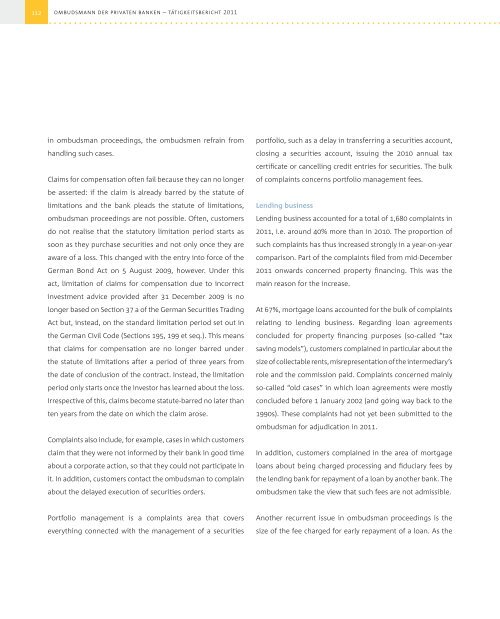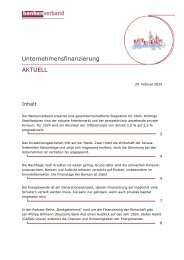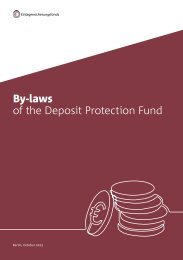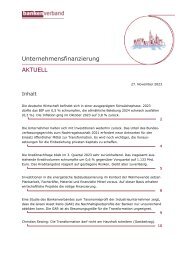Summary of the Ombudsman´s Report 2011
In 2012 we celebrate the 20th Anniversary of the German private commercial banks´ Ombudsman Scheme. When it launched its Ombudsman Scheme in 1992, making it the first leading German financial-sector association to do so.
In 2012 we celebrate the 20th Anniversary of the German private commercial banks´ Ombudsman Scheme. When it launched its Ombudsman Scheme in 1992, making it the first leading German financial-sector association to do so.
Create successful ePaper yourself
Turn your PDF publications into a flip-book with our unique Google optimized e-Paper software.
112 ombudsmann der privaten banken – tätigkeitsbericht <strong>2011</strong><br />
in ombudsman proceedings, <strong>the</strong> ombudsmen refrain from<br />
handling such cases.<br />
Claims for compensation <strong>of</strong>ten fail because <strong>the</strong>y can no longer<br />
be asserted: if <strong>the</strong> claim is already barred by <strong>the</strong> statute <strong>of</strong><br />
limitations and <strong>the</strong> bank pleads <strong>the</strong> statute <strong>of</strong> limitations,<br />
ombudsman proceedings are not possible. Often, customers<br />
do not realise that <strong>the</strong> statutory limitation period starts as<br />
soon as <strong>the</strong>y purchase securities and not only once <strong>the</strong>y are<br />
aware <strong>of</strong> a loss. This changed with <strong>the</strong> entry into force <strong>of</strong> <strong>the</strong><br />
German Bond Act on 5 August 2009, however. Under this<br />
act, limitation <strong>of</strong> claims for compensation due to incorrect<br />
investment advice provided after 31 December 2009 is no<br />
longer based on Section 37 a <strong>of</strong> <strong>the</strong> German Securities Trading<br />
Act but, instead, on <strong>the</strong> standard limitation period set out in<br />
<strong>the</strong> German Civil Code (Sections 195, 199 et seq.). This means<br />
that claims for compensation are no longer barred under<br />
<strong>the</strong> statute <strong>of</strong> limitations after a period <strong>of</strong> three years from<br />
<strong>the</strong> date <strong>of</strong> conclusion <strong>of</strong> <strong>the</strong> contract. Instead, <strong>the</strong> limitation<br />
period only starts once <strong>the</strong> investor has learned about <strong>the</strong> loss.<br />
Irrespective <strong>of</strong> this, claims become statute-barred no later than<br />
ten years from <strong>the</strong> date on which <strong>the</strong> claim arose.<br />
Complaints also include, for example, cases in which customers<br />
claim that <strong>the</strong>y were not informed by <strong>the</strong>ir bank in good time<br />
about a corporate action, so that <strong>the</strong>y could not participate in<br />
it. In addition, customers contact <strong>the</strong> ombudsman to complain<br />
about <strong>the</strong> delayed execution <strong>of</strong> securities orders.<br />
portfolio, such as a delay in transferring a securities account,<br />
closing a securities account, issuing <strong>the</strong> 2010 annual tax<br />
certificate or cancelling credit entries for securities. The bulk<br />
<strong>of</strong> complaints concerns portfolio management fees.<br />
Lending business<br />
Lending business accounted for a total <strong>of</strong> 1,680 complaints in<br />
<strong>2011</strong>, i.e. around 40% more than in 2010. The proportion <strong>of</strong><br />
such complaints has thus increased strongly in a year-on-year<br />
comparison. Part <strong>of</strong> <strong>the</strong> complaints filed from mid-December<br />
<strong>2011</strong> onwards concerned property financing. This was <strong>the</strong><br />
main reason for <strong>the</strong> increase.<br />
At 67%, mortgage loans accounted for <strong>the</strong> bulk <strong>of</strong> complaints<br />
relating to lending business. Regarding loan agreements<br />
concluded for property financing purposes (so-called “tax<br />
saving models”), customers complained in particular about <strong>the</strong><br />
size <strong>of</strong> collectable rents, misrepresentation <strong>of</strong> <strong>the</strong> intermediary’s<br />
role and <strong>the</strong> commission paid. Complaints concerned mainly<br />
so-called “old cases” in which loan agreements were mostly<br />
concluded before 1 January 2002 (and going way back to <strong>the</strong><br />
1990s). These complaints had not yet been submitted to <strong>the</strong><br />
ombudsman for adjudication in <strong>2011</strong>.<br />
In addition, customers complained in <strong>the</strong> area <strong>of</strong> mortgage<br />
loans about being charged processing and fiduciary fees by<br />
<strong>the</strong> lending bank for repayment <strong>of</strong> a loan by ano<strong>the</strong>r bank. The<br />
ombudsmen take <strong>the</strong> view that such fees are not admissible.<br />
Portfolio management is a complaints area that covers<br />
everything connected with <strong>the</strong> management <strong>of</strong> a securities<br />
Ano<strong>the</strong>r recurrent issue in ombudsman proceedings is <strong>the</strong><br />
size <strong>of</strong> <strong>the</strong> fee charged for early repayment <strong>of</strong> a loan. As <strong>the</strong>


















